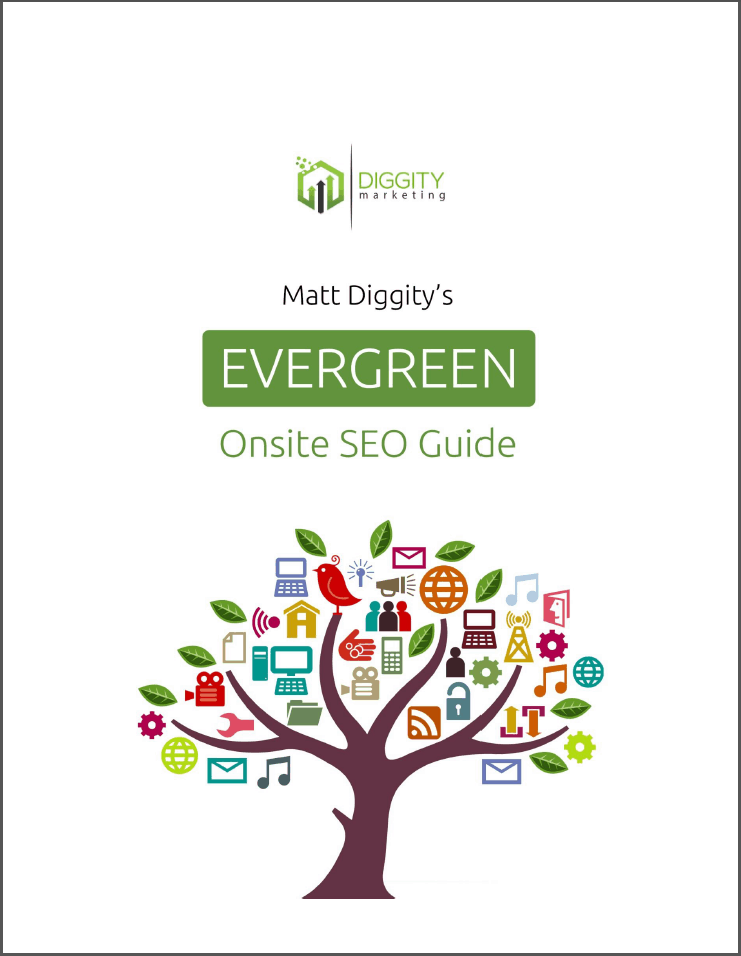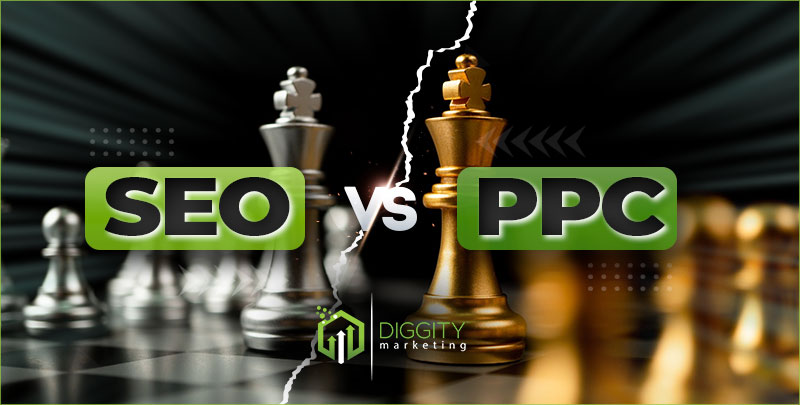
You have two main options if you want to make a website grow. It comes down to SEO vs. PPC. Online business owners rarely have a marketing budget that lets them invest heavily in both at the same time. So, if a choice has to be made, which one is better?
In this guide, I’ll share my personal experience and expertise to help you understand the pros and cons of both SEO and PPC, as well as the factors that go into choosing the right path. We’ll delve into updated definitions for these concepts, explore their differences, and offer insights into which one is the best. Having utilized both strategies, I’ll reveal which one has yielded better results for me.
Table Of Contents
Prefer to consume your information via video? Watch and learn about it all here:
SEO: What It Is and When It Matters
What is Search Engine Optimization (SEO)?
SEO refers to the changes that are made to a website to make it appear on search engines like Google. If you do it well, your business will appear above others when people search for related keywords and terms. This equals more traffic for you.
Traffic that is earned from search engine optimization is known as organic traffic to distinguish it from paid search traffic (more on that when we cover PPC campaigns). It takes time and sound decisions to work your business into organic search results, but the returns can be significant.
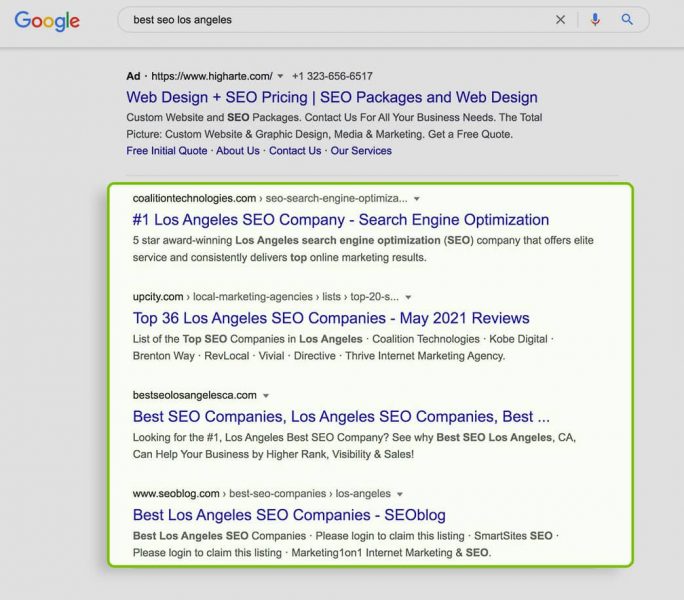
The definition of SEO hasn’t changed in nearly 15 years. However, what works for SEO has changed significantly in just the last few years. Thanks to Google’s regular algorithm updates, you can expect it to continue to change in the future.
In the distant past, keywords alone were supreme. Today, creating high-quality content, building links, and keeping your site completely free of technical errors are some elements that can make the biggest difference for your SEO.
What Is the SEO Investment Philosophy?
When you invest in SEO, you are investing in long-term cumulative growth.
New links or content are not going to draw in new visitors immediately. However, they may eventually be so effective that your site will continue to grow with only small investments of time and money every month.
The SEO investment philosophy also advocates for a holistic approach toward building a robust online presence. This involves investing in technical SEO to ensure that your website is easily crawlable and indexable by search engines. At the same time, it involves working on on-page SEO by optimizing content with relevant keywords and providing useful information that meets user intent.
A part of the SEO philosophy is understanding that SEO isn’t just a marketing tactic, but a strategic business initiative. As you gather data about your audience’s behavior, preferences, and needs, you’re empowered to make informed business decisions and shape products or services that cater directly to your audience’s needs. This is how the long-term SEO strategy can go beyond driving website traffic to facilitate business growth.
In the SEO investment philosophy, patience is a virtue. The fruits of your efforts might not be visible immediately, but with consistent effort and optimization, SEO can lead to impressive organic growth. It’s about embracing a marathon mindset over a sprint, where continuous small enhancements can lead to a strong, dominant web presence in the long run.
What Sets SEO Apart?
SEO Is Earned (but Not Necessarily Free)
SEO is earned. There is no price that your business can pay for immediate results.
Every SEO campaign—no matter how advanced—will take time. If you post the finest content in your niche, it will need to mature before you see growth. The results you want may take months to achieve.
Don’t let that scare you, though. We prefer SEO because it’s worth it. SEO—with enough work—delivers momentum. Think of it like a flywheel (or a bicycle gear). At first, turning it is hard. Once it picks up speed, it feels like it barely even needs you anymore.
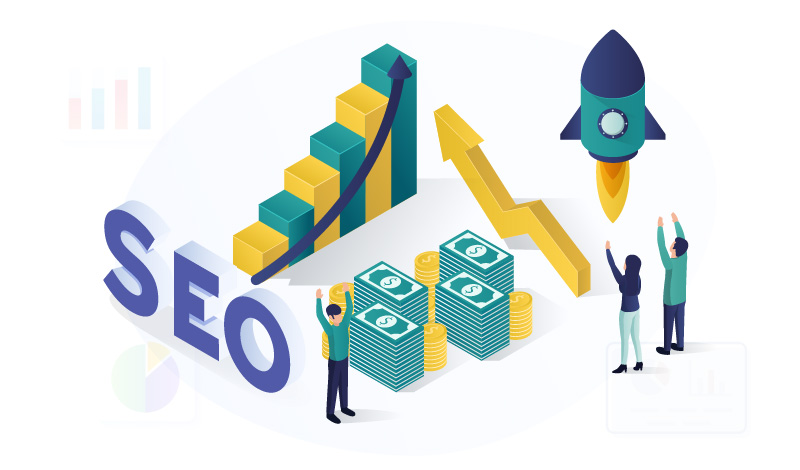
If you can get Google to recognize your site, the rewards keep pouring in. A better place on the search engine results pages means more traffic. More traffic can mean an even better result.
There are costs to producing content, developing links, and keeping your website free of errors. You may need the help of another company to even know what topics you should be targeting.
If you can’t handle this work or devote enough time to earning success the long way, you’ll probably need to hire people to do it for you.
Organic Traffic Converts Better
SEO traffic can deliver excellent conversion rates. People who arrive from organic search results are actively seeking out information related to their terms. They trust the information they find on their own more than they trust search engine ads.
That doesn’t mean your website can’t be badly optimized for conversions. You still need to know what you’re doing for SEO copy to convert.
Targeting Can Be Difficult
One of the cons of SEO is that you don’t have complete control over the organic search traffic that search engines deliver.
They may rank you for topics that aren’t strictly related to the products or services that you want to sell on your website. As a result, the people arriving may not be interested in reading anything you have to say or buying anything you want to sell.
In some cases, this may be because you didn’t take the right steps to optimize your site. Focusing on the wrong keyword set or targeting the wrong intent may drive the wrong traffic to your website.
SEO Is a Competitive Practice That Rewards Skill
You must account for the fact that SEO is a competitive practice. The sites that rank above and below you are likely working on their SEO marketing, too.
To succeed, you’ll have to make better decisions than them over time. That often means keeping up with the latest SEO news, staying up-to-date with organic SEO’s best practices, and steering clear of prohibited practices.
When Should You Use SEO?
You should use SEO marketing when you want sustainable, high-ROI traffic. SEO is so essential to long-term growth that it cannot be left out of the equation even if you decide to spend more on search marketing for the time being.
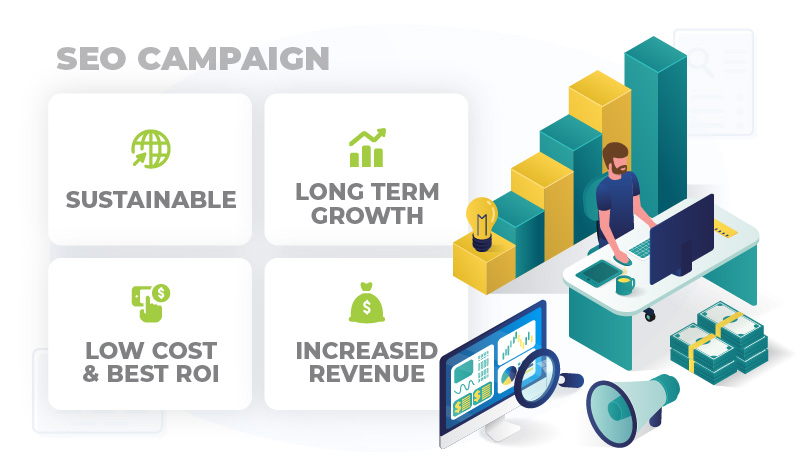
While SEO marketing may take time and come with high initial costs, you can apply the fundamentals even if most of your budget is focused elsewhere.
For some small-business-dominated niches, building just one good piece of SEO content or link a month can help you lay the groundwork for future success.
SEO can play an important role in the growth of nearly every website. However, that does not mean that it’s superior to PPC in every case. Text ads and search engine marketing may be the strategy that your website needs right now.
SEO is pivotal when you want to establish a robust online presence and credibility. An effective SEO strategy ensures that your website appears organically in search engine results, thereby signaling to users that your site is a trustworthy and authoritative source of information. This can greatly enhance your brand’s reputation and influence.
It is also recommended when you aim to attract a steady flow of free traffic. Unlike PPC, where you pay for every click, the organic traffic generated through SEO doesn’t come with direct costs. This can be particularly beneficial if your business is in its early stages and working with a limited budget.
SEO is indispensable when you want to target certain keywords in your industry or niche. By optimizing your website and content around these keywords, you can ensure that you appear in relevant searches. This can significantly increase the likelihood of attracting visitors who are interested in your products or services.
This is a strategy for businesses looking to stand out in a crowded market. Through localized SEO, for instance, you can focus on your specific geographical area, making it easier for local customers to find you. This is especially important for businesses like restaurants, retail stores, or other services that depend on local patronage.
SEO should be utilized when long-term visibility is a key business objective. Though it requires patience and consistency, the long-lasting benefits it provides make it a worthwhile investment. It enhances user experience, builds trust, drives free traffic, and creates a solid foundation for your business to expand online.
PPC: What It Is and When It Matters
What is PPC (Pay Per Click)?
PPC stands for pay-per-click, a model of internet marketing in which advertisers pay a fee each time one of their ads is clicked.
PPC isn’t limited to just Google ads. Plenty of other search engines use PPC ads. Websites can embed ads as well, either via their own PPC program or by signing up with other Ads networks.
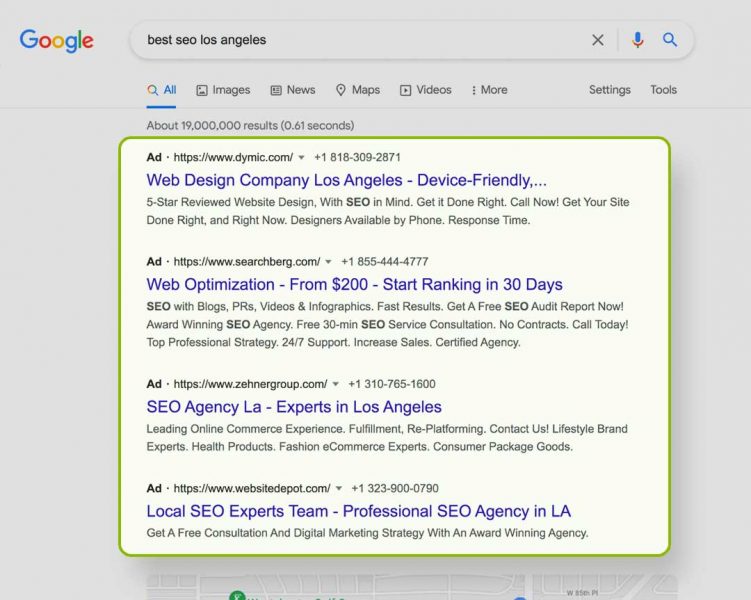
When you perform searches on major search engines—or even on major social media platforms like YouTube and Reddit—you’ll see these paid ads labeled with the word “ad” or “sponsored.” These results—prominently featured at the top—are what PPC advertisers are paying for.
Google (and many other search engines) manage these ad programs and dictate how much you’ll need to pay each time a user clicks on your ads. The cost per click may be high or low, depending on your keywords and niche.
What Is the PPC Investment Philosophy?
PPC investment philosophy means immediate visibility and traffic from Google. As well as other search platforms, popular websites, or social media. This will be worthwhile to your business if you have a lot of competition or need to earn your first potential customers fast.
Google ads, for example, appear at the very top of search engine results.
Even the most successful organic search engine results don’t appear until you’ve scrolled past the ads.
You can claim this advantage using PPC marketing even if your website is a day old. The results will last as long as you’re willing to maintain the ad space.
PPC advertising is a practical strategy in the modern digital age, given its flexibility and scalability. It’s a dynamic approach that allows advertisers to fine-tune their campaigns based on data-driven insights. This could be adjusting the ad spend, refining keywords, or even modifying the ad copy to enhance click-through rates.
Another salient feature of the PPC investment philosophy is its real-time trackability. You can monitor the performance of your campaigns in real-time and take immediate action to optimize them. This is a vital feature, considering the fast-paced and ever-changing landscape of online marketing.
The potential of PPC goes beyond immediate results. Over time, the data collected from your PPC campaigns can provide valuable insights into your target market’s behavior, interests, and preferences. This information can be used to inform other marketing strategies and improve overall business decision-making.
Finally, PPC isn’t just for large enterprises with massive budgets. With careful planning and effective management, even small and medium-sized businesses can leverage PPC for its maximum potential. This democratic aspect of PPC makes it a powerful tool in leveling the playing field in the digital marketplace.
What Sets PPC Apart?
PPC Is Purely Pay-to-Play
The effects of PPC marketing are immediate and constant as long as you’re paying for the ads.
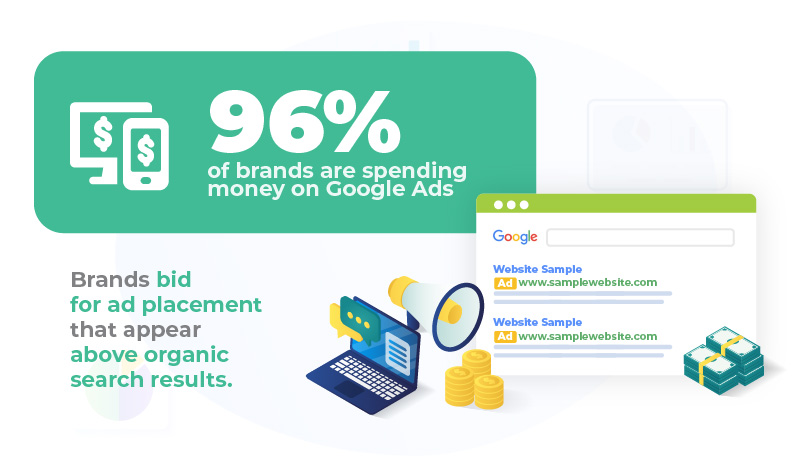
The results you get from a PPC campaign are also strictly temporary.
On the other hand, paid search ads don’t have any lasting effects on your traffic numbers. The only way you will see traffic growth is if your visitors are motivated to return directly to your website again.
Return visits may happen if your landing page is convincing, but it’s not cumulative in the way organic growth is.
You Can Control the Landing Pages
With PPC marketing, there’s no risk that an unplanned page will somehow rank more effectively than other web pages. Your ads will send visitors only to the pages that you designate.
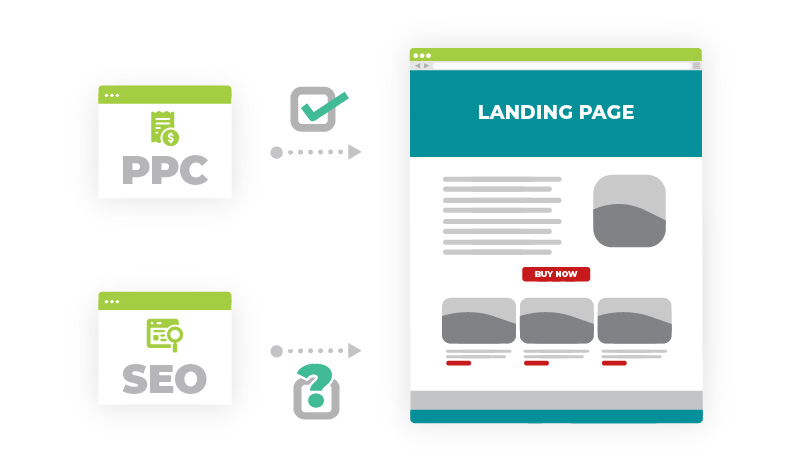
Additionally, you have complete control over the copy that is used on your landing page. You don’t need to worry about modifying it to target the right keywords or expanding it in order to be more competitive in organic results.
If you want to create a landing page that’s nothing but a sentence and an order button, you’re free to do so (but good luck converting).
Furthermore, you can change these pages at any time depending on the demands of your paid search marketing campaign.
You Can Run Ads to Highly Specific Market Segments
Search advertising can be targeted with incredible precision. For example, Google’s ad platform not only allows you to target specific keywords but also references data that tracks the ages, genders, locations, and device types of their users.
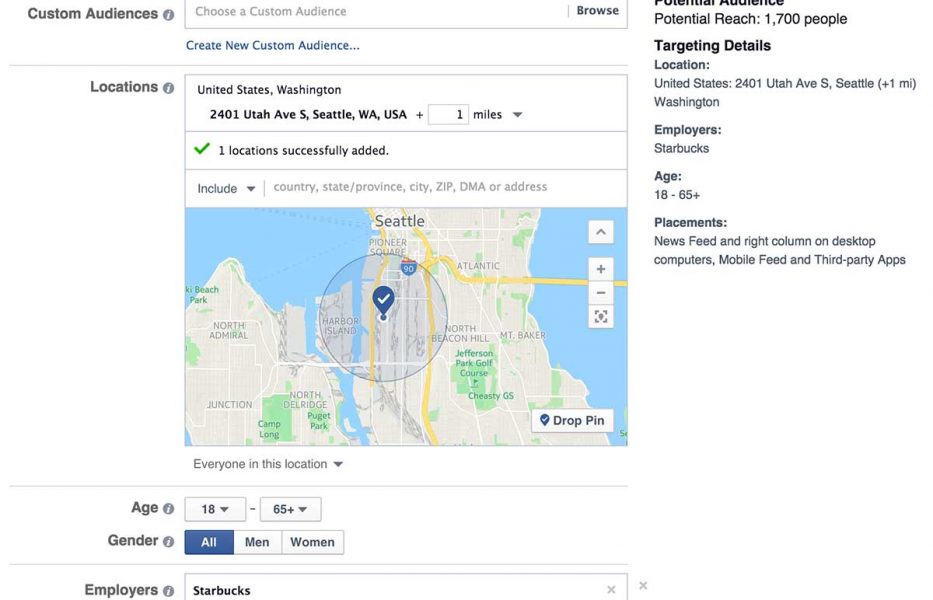
You can target your ads along all of these lines and deliver them to the exact audience you want.
PPC Is a Competitive Practice That Rewards Aggressive Budgets
Like SEO, PPC is competitive. However, the biggest rewards tend to go to marketers who can afford to spend the most money to beat organic results and other sites using pay-per-click advertising.
It is possible to overwhelm the competition if you just keep outbidding them on your chosen keyword. However, that doesn’t mean that skill isn’t involved in a PPC campaign.

Skill definitely comes into play with PPC. You can be more or less effective at choosing keywords, targeting demographics, crafting ad copy, or converting with calls to action.
Naturally, if you’re not skilled at managing a PPC campaign, you can lose a lot of money without driving many sales.
The business with the biggest budget has a huge advantage, but it always pays to be more strategic.
When Should You Use PPC?
You should use PPC if your site is aged, but really you can use it at any stage. New sites can benefit from getting instant traffic (and get their investment back faster). Aged sites can use paid advertising to emphasize new products or put their existing products in front of new buyers.
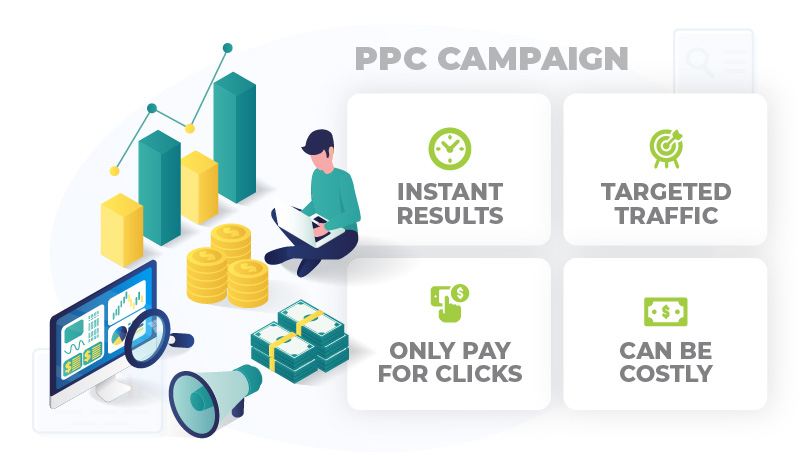
Now, you understand some of the factors that make both SEO and PPC valuable. It’s time to look at which one comes out on top when you have to make a choice.
SEO vs PPC: Which One Is Better?
SEO or PPC can be the superior option depending on the context.
Cumulative growth is always important. If you’re like most business site owners, you don’t want to spend massive amounts of money on promoting your site every month forever.
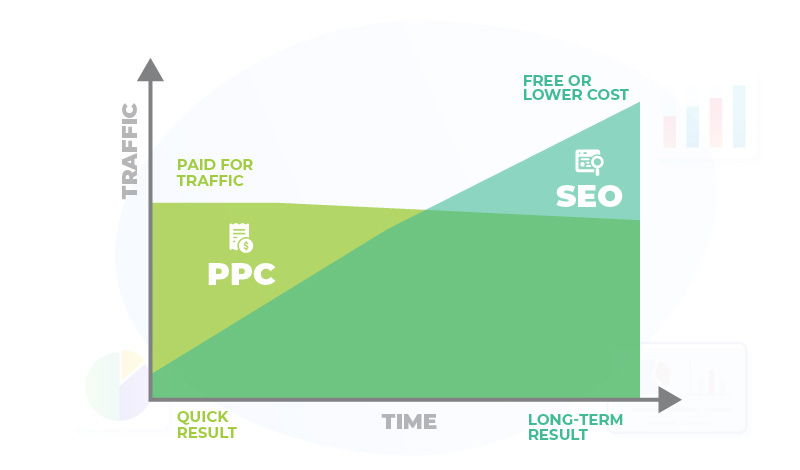
Only SEO promises you the chance to eventually cut your costs and collect profits. You just have to remember that the results of organic SEO will take a long time to materialize.
However, driving traffic in the short term is also an important goal if you want a website to succeed. If you can’t afford to wait for your site to be wildly popular in one year’s (or more) time, PPC allows you to start driving traffic to your web pages right now.
SEO and PPC: Should You Use Both?
Using both SEO and PPC search ads can be effective for many different sites. One of the best ways to combine their effects is to use them in combination.
For example, in the real estate industry, implementing SEO strategies and real estate PPC campaigns have worked great for agents as this strategy gives them more visibility and and helps them sell more listings.
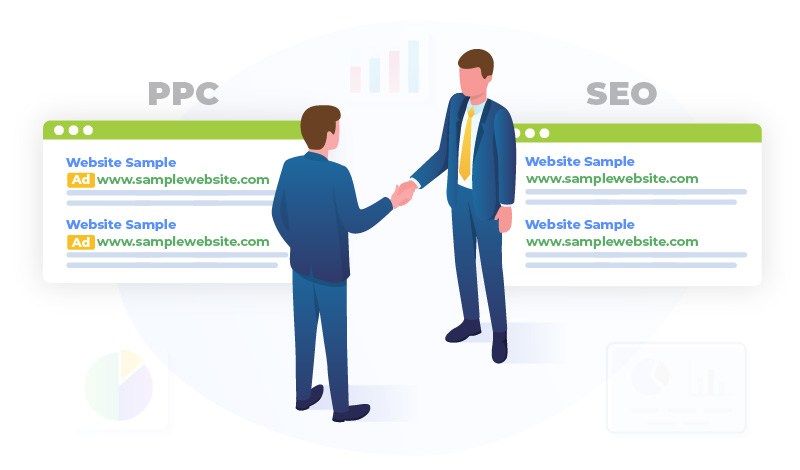
It’s good when you can make your money back in a relatively short amount of time. This is particularly important for e-commerce sites. PPC ads point to products. People buy products, and you make your money back.
PPC can work on content sites, too. For example, on a popular blog, you can create a course that you send ads to. Someone buys, and then you make your money back
You use both as a one-two punch. Launch a PPC campaign to get results from fast traffic, then implement SEO. Organic SEO lets you play the long game and hold traffic while spending the minimum amount to maintain your momentum.
Make the Right Choice Between SEO vs. PPC
Choosing between SEO vs PPC can be difficult, but you’re now in a position to understand the pros and cons of both SEO and PPC.
You know why business sites invest in SEO or PPC, what sets them apart, and when you should use them both to get the results you want.
You also have a better idea of which digital marketing strategy is going to help you the most, depending on what your site is about and how old it is.
Maybe SEO is the right digital marketing strategy for your site, but you’re too busy with the big ideas to handle the grunt work? Leave it to the people at The Search Initiative. Our professional team can manage your organic growth from strategy to implementation.


